Year 1 Sem 2: Analysis of Staff Turnover at Imperial Hotel Report
VerifiedAdded on 2022/08/10
|10
|2630
|498
Report
AI Summary
This report examines the issue of high staff turnover at the Imperial Hotel, a 4-star hotel chain in the UK, focusing on its London location. It identifies key challenges contributing to staff turnover, including low pay, negative working culture, lack of training, poor management, and inadequate working conditions. The report analyzes the effects of high turnover, such as increased costs, compromised service quality, and damage to the hotel's reputation. An action plan is proposed, emphasizing improved training programs, effective recruitment methods, reward and recognition systems, and enhanced working conditions to improve employee retention. Recommendations include aligning training with organizational goals, implementing financial and non-financial incentives, and creating a positive working environment. The report concludes that addressing staff turnover is crucial for improving teamwork, organizational culture, and guest satisfaction, with flexible schedules and employee feedback being key components of a successful strategy. The report is based on the Introduction to Management course (QAB020C414S) and provides a detailed analysis of the issues and actionable solutions for the hotel management.
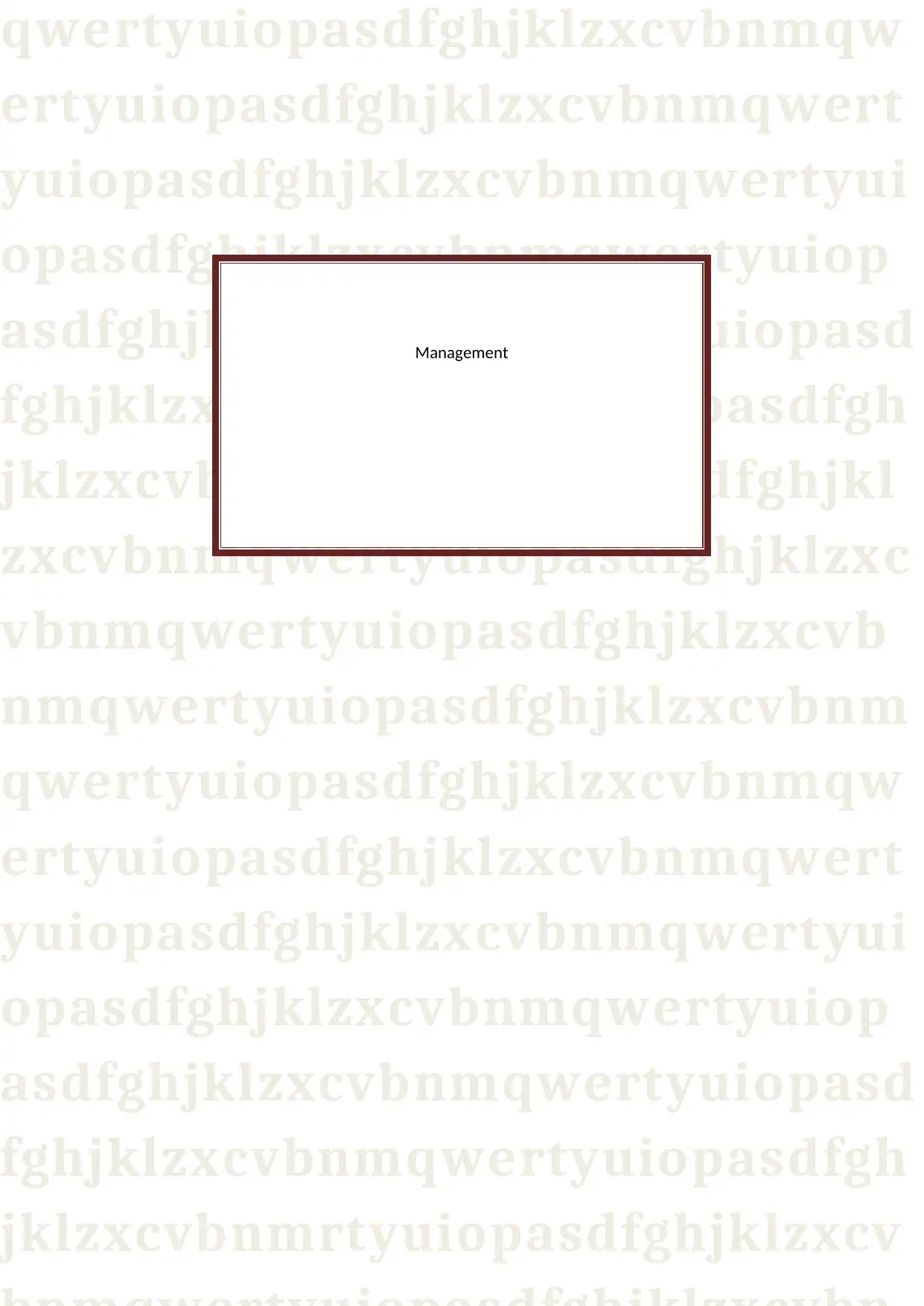
qwertyuiopasdfghjklzxcvbnmqw
ertyuiopasdfghjklzxcvbnmqwert
yuiopasdfghjklzxcvbnmqwertyui
opasdfghjklzxcvbnmqwertyuiop
asdfghjklzxcvbnmqwertyuiopasd
fghjklzxcvbnmqwertyuiopasdfgh
jklzxcvbnmqwertyuiopasdfghjkl
zxcvbnmqwertyuiopasdfghjklzxc
vbnmqwertyuiopasdfghjklzxcvb
nmqwertyuiopasdfghjklzxcvbnm
qwertyuiopasdfghjklzxcvbnmqw
ertyuiopasdfghjklzxcvbnmqwert
yuiopasdfghjklzxcvbnmqwertyui
opasdfghjklzxcvbnmqwertyuiop
asdfghjklzxcvbnmqwertyuiopasd
fghjklzxcvbnmqwertyuiopasdfgh
jklzxcvbnmrtyuiopasdfghjklzxcv
Management
ertyuiopasdfghjklzxcvbnmqwert
yuiopasdfghjklzxcvbnmqwertyui
opasdfghjklzxcvbnmqwertyuiop
asdfghjklzxcvbnmqwertyuiopasd
fghjklzxcvbnmqwertyuiopasdfgh
jklzxcvbnmqwertyuiopasdfghjkl
zxcvbnmqwertyuiopasdfghjklzxc
vbnmqwertyuiopasdfghjklzxcvb
nmqwertyuiopasdfghjklzxcvbnm
qwertyuiopasdfghjklzxcvbnmqw
ertyuiopasdfghjklzxcvbnmqwert
yuiopasdfghjklzxcvbnmqwertyui
opasdfghjklzxcvbnmqwertyuiop
asdfghjklzxcvbnmqwertyuiopasd
fghjklzxcvbnmqwertyuiopasdfgh
jklzxcvbnmrtyuiopasdfghjklzxcv
Management
Paraphrase This Document
Need a fresh take? Get an instant paraphrase of this document with our AI Paraphraser
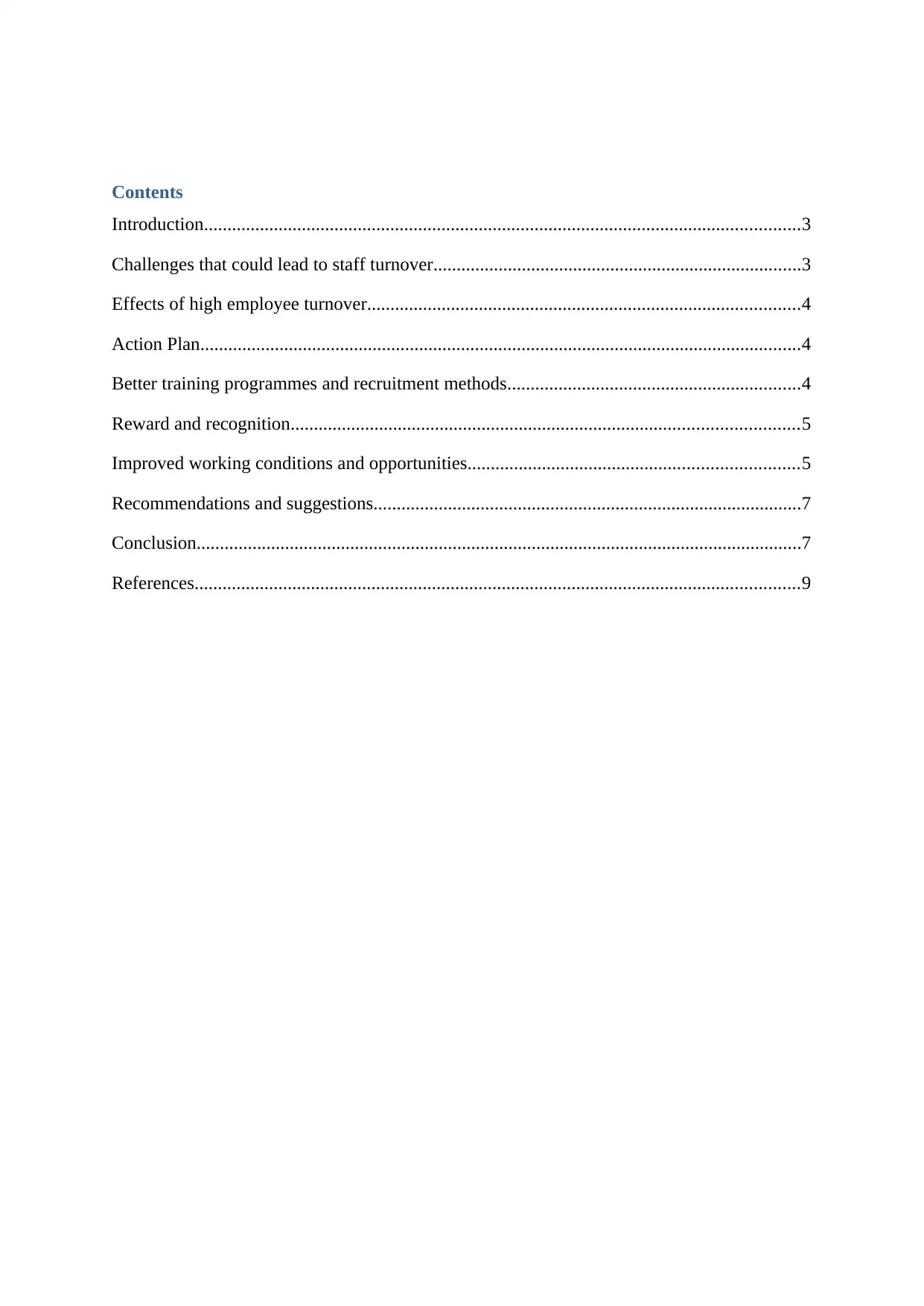
Contents
Introduction................................................................................................................................3
Challenges that could lead to staff turnover...............................................................................3
Effects of high employee turnover.............................................................................................4
Action Plan.................................................................................................................................4
Better training programmes and recruitment methods...............................................................4
Reward and recognition.............................................................................................................5
Improved working conditions and opportunities.......................................................................5
Recommendations and suggestions............................................................................................7
Conclusion..................................................................................................................................7
References..................................................................................................................................9
Introduction................................................................................................................................3
Challenges that could lead to staff turnover...............................................................................3
Effects of high employee turnover.............................................................................................4
Action Plan.................................................................................................................................4
Better training programmes and recruitment methods...............................................................4
Reward and recognition.............................................................................................................5
Improved working conditions and opportunities.......................................................................5
Recommendations and suggestions............................................................................................7
Conclusion..................................................................................................................................7
References..................................................................................................................................9
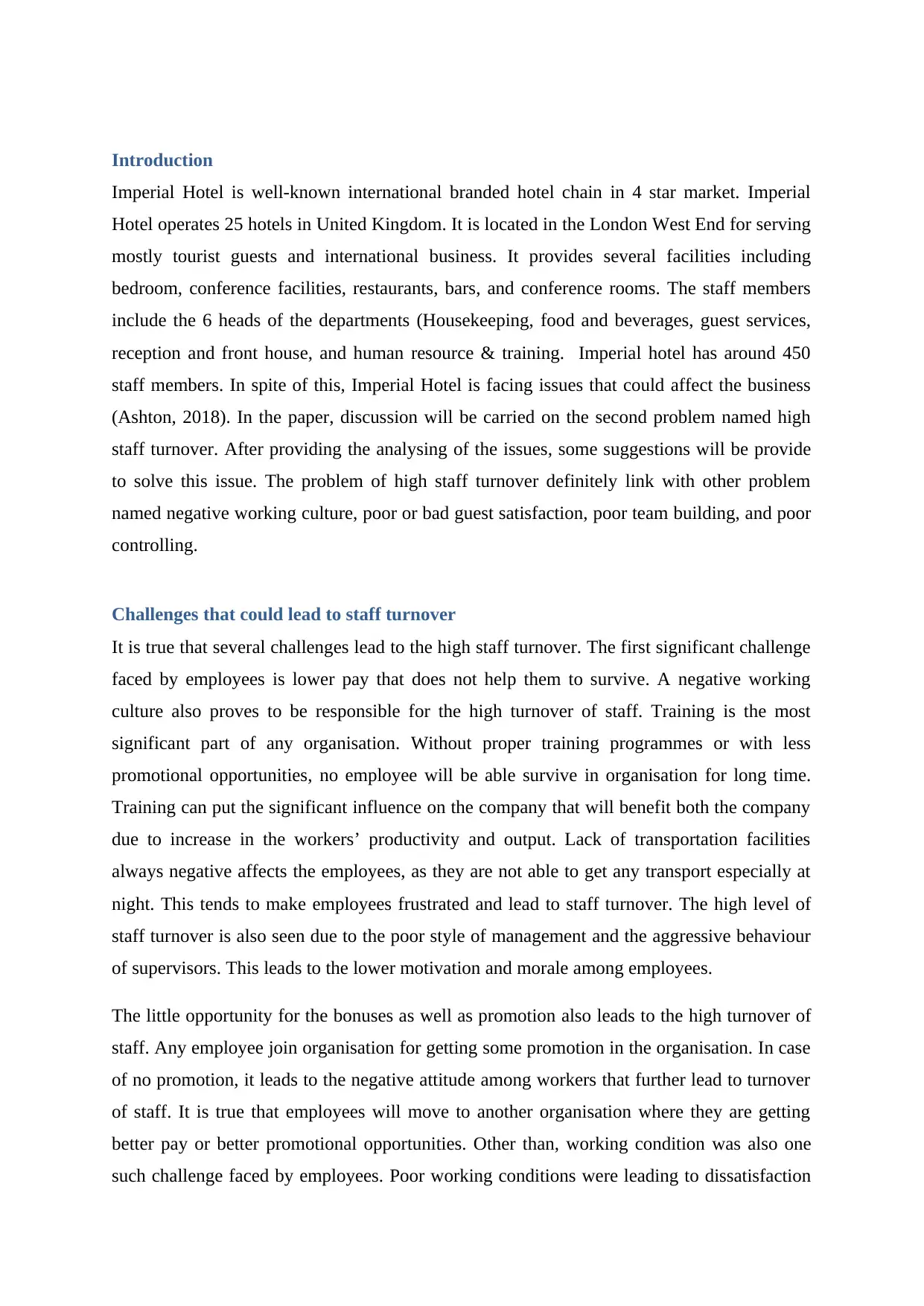
Introduction
Imperial Hotel is well-known international branded hotel chain in 4 star market. Imperial
Hotel operates 25 hotels in United Kingdom. It is located in the London West End for serving
mostly tourist guests and international business. It provides several facilities including
bedroom, conference facilities, restaurants, bars, and conference rooms. The staff members
include the 6 heads of the departments (Housekeeping, food and beverages, guest services,
reception and front house, and human resource & training. Imperial hotel has around 450
staff members. In spite of this, Imperial Hotel is facing issues that could affect the business
(Ashton, 2018). In the paper, discussion will be carried on the second problem named high
staff turnover. After providing the analysing of the issues, some suggestions will be provide
to solve this issue. The problem of high staff turnover definitely link with other problem
named negative working culture, poor or bad guest satisfaction, poor team building, and poor
controlling.
Challenges that could lead to staff turnover
It is true that several challenges lead to the high staff turnover. The first significant challenge
faced by employees is lower pay that does not help them to survive. A negative working
culture also proves to be responsible for the high turnover of staff. Training is the most
significant part of any organisation. Without proper training programmes or with less
promotional opportunities, no employee will be able survive in organisation for long time.
Training can put the significant influence on the company that will benefit both the company
due to increase in the workers’ productivity and output. Lack of transportation facilities
always negative affects the employees, as they are not able to get any transport especially at
night. This tends to make employees frustrated and lead to staff turnover. The high level of
staff turnover is also seen due to the poor style of management and the aggressive behaviour
of supervisors. This leads to the lower motivation and morale among employees.
The little opportunity for the bonuses as well as promotion also leads to the high turnover of
staff. Any employee join organisation for getting some promotion in the organisation. In case
of no promotion, it leads to the negative attitude among workers that further lead to turnover
of staff. It is true that employees will move to another organisation where they are getting
better pay or better promotional opportunities. Other than, working condition was also one
such challenge faced by employees. Poor working conditions were leading to dissatisfaction
Imperial Hotel is well-known international branded hotel chain in 4 star market. Imperial
Hotel operates 25 hotels in United Kingdom. It is located in the London West End for serving
mostly tourist guests and international business. It provides several facilities including
bedroom, conference facilities, restaurants, bars, and conference rooms. The staff members
include the 6 heads of the departments (Housekeeping, food and beverages, guest services,
reception and front house, and human resource & training. Imperial hotel has around 450
staff members. In spite of this, Imperial Hotel is facing issues that could affect the business
(Ashton, 2018). In the paper, discussion will be carried on the second problem named high
staff turnover. After providing the analysing of the issues, some suggestions will be provide
to solve this issue. The problem of high staff turnover definitely link with other problem
named negative working culture, poor or bad guest satisfaction, poor team building, and poor
controlling.
Challenges that could lead to staff turnover
It is true that several challenges lead to the high staff turnover. The first significant challenge
faced by employees is lower pay that does not help them to survive. A negative working
culture also proves to be responsible for the high turnover of staff. Training is the most
significant part of any organisation. Without proper training programmes or with less
promotional opportunities, no employee will be able survive in organisation for long time.
Training can put the significant influence on the company that will benefit both the company
due to increase in the workers’ productivity and output. Lack of transportation facilities
always negative affects the employees, as they are not able to get any transport especially at
night. This tends to make employees frustrated and lead to staff turnover. The high level of
staff turnover is also seen due to the poor style of management and the aggressive behaviour
of supervisors. This leads to the lower motivation and morale among employees.
The little opportunity for the bonuses as well as promotion also leads to the high turnover of
staff. Any employee join organisation for getting some promotion in the organisation. In case
of no promotion, it leads to the negative attitude among workers that further lead to turnover
of staff. It is true that employees will move to another organisation where they are getting
better pay or better promotional opportunities. Other than, working condition was also one
such challenge faced by employees. Poor working conditions were leading to dissatisfaction
⊘ This is a preview!⊘
Do you want full access?
Subscribe today to unlock all pages.

Trusted by 1+ million students worldwide
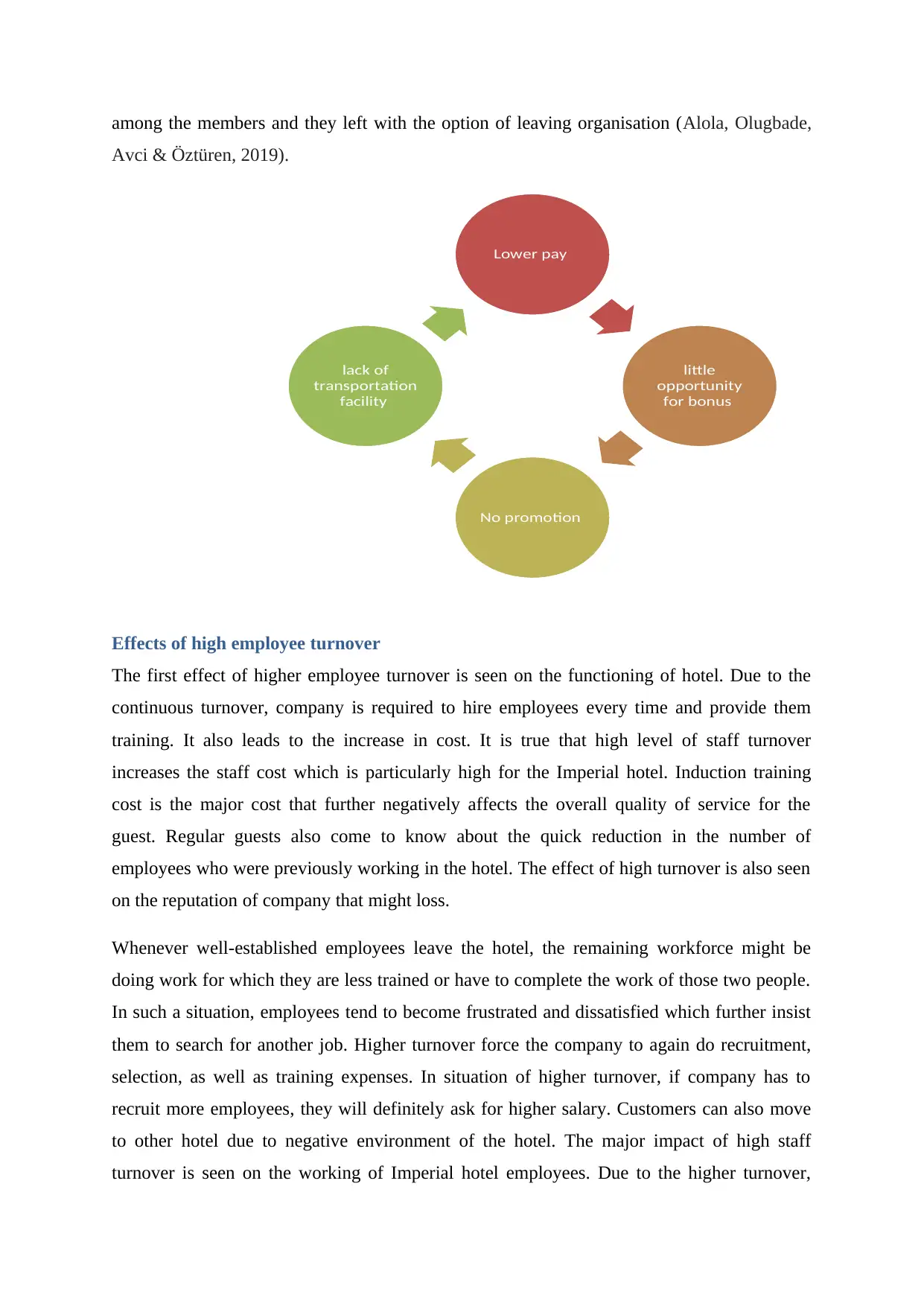
among the members and they left with the option of leaving organisation (Alola, Olugbade,
Avci & Öztüren, 2019).
Effects of high employee turnover
The first effect of higher employee turnover is seen on the functioning of hotel. Due to the
continuous turnover, company is required to hire employees every time and provide them
training. It also leads to the increase in cost. It is true that high level of staff turnover
increases the staff cost which is particularly high for the Imperial hotel. Induction training
cost is the major cost that further negatively affects the overall quality of service for the
guest. Regular guests also come to know about the quick reduction in the number of
employees who were previously working in the hotel. The effect of high turnover is also seen
on the reputation of company that might loss.
Whenever well-established employees leave the hotel, the remaining workforce might be
doing work for which they are less trained or have to complete the work of those two people.
In such a situation, employees tend to become frustrated and dissatisfied which further insist
them to search for another job. Higher turnover force the company to again do recruitment,
selection, as well as training expenses. In situation of higher turnover, if company has to
recruit more employees, they will definitely ask for higher salary. Customers can also move
to other hotel due to negative environment of the hotel. The major impact of high staff
turnover is seen on the working of Imperial hotel employees. Due to the higher turnover,
Lower pay
little
opportunity
for bonus
No promotion
lack of
transportation
facility
Avci & Öztüren, 2019).
Effects of high employee turnover
The first effect of higher employee turnover is seen on the functioning of hotel. Due to the
continuous turnover, company is required to hire employees every time and provide them
training. It also leads to the increase in cost. It is true that high level of staff turnover
increases the staff cost which is particularly high for the Imperial hotel. Induction training
cost is the major cost that further negatively affects the overall quality of service for the
guest. Regular guests also come to know about the quick reduction in the number of
employees who were previously working in the hotel. The effect of high turnover is also seen
on the reputation of company that might loss.
Whenever well-established employees leave the hotel, the remaining workforce might be
doing work for which they are less trained or have to complete the work of those two people.
In such a situation, employees tend to become frustrated and dissatisfied which further insist
them to search for another job. Higher turnover force the company to again do recruitment,
selection, as well as training expenses. In situation of higher turnover, if company has to
recruit more employees, they will definitely ask for higher salary. Customers can also move
to other hotel due to negative environment of the hotel. The major impact of high staff
turnover is seen on the working of Imperial hotel employees. Due to the higher turnover,
Lower pay
little
opportunity
for bonus
No promotion
lack of
transportation
facility
Paraphrase This Document
Need a fresh take? Get an instant paraphrase of this document with our AI Paraphraser
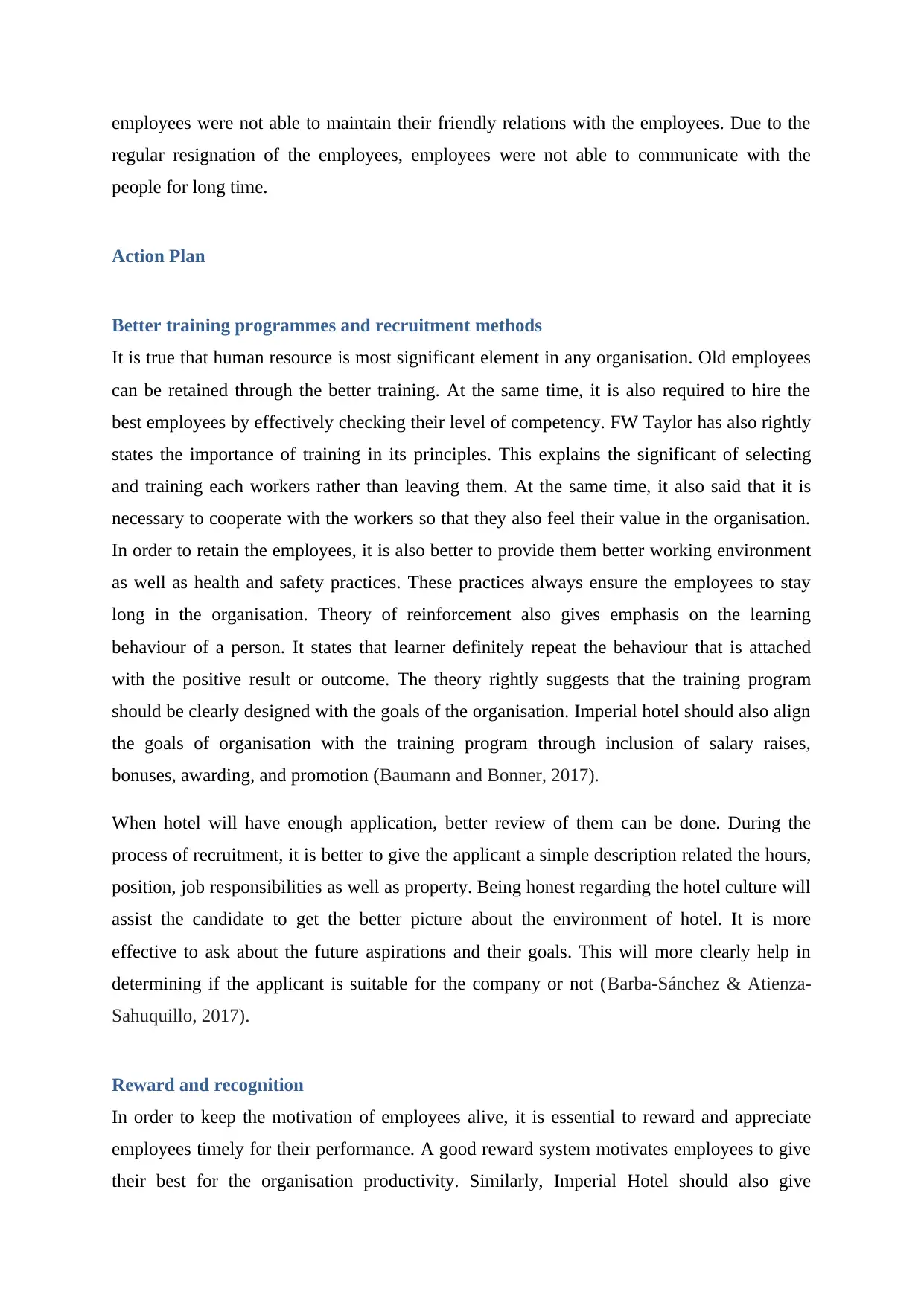
employees were not able to maintain their friendly relations with the employees. Due to the
regular resignation of the employees, employees were not able to communicate with the
people for long time.
Action Plan
Better training programmes and recruitment methods
It is true that human resource is most significant element in any organisation. Old employees
can be retained through the better training. At the same time, it is also required to hire the
best employees by effectively checking their level of competency. FW Taylor has also rightly
states the importance of training in its principles. This explains the significant of selecting
and training each workers rather than leaving them. At the same time, it also said that it is
necessary to cooperate with the workers so that they also feel their value in the organisation.
In order to retain the employees, it is also better to provide them better working environment
as well as health and safety practices. These practices always ensure the employees to stay
long in the organisation. Theory of reinforcement also gives emphasis on the learning
behaviour of a person. It states that learner definitely repeat the behaviour that is attached
with the positive result or outcome. The theory rightly suggests that the training program
should be clearly designed with the goals of the organisation. Imperial hotel should also align
the goals of organisation with the training program through inclusion of salary raises,
bonuses, awarding, and promotion (Baumann and Bonner, 2017).
When hotel will have enough application, better review of them can be done. During the
process of recruitment, it is better to give the applicant a simple description related the hours,
position, job responsibilities as well as property. Being honest regarding the hotel culture will
assist the candidate to get the better picture about the environment of hotel. It is more
effective to ask about the future aspirations and their goals. This will more clearly help in
determining if the applicant is suitable for the company or not (Barba-Sánchez & Atienza-
Sahuquillo, 2017).
Reward and recognition
In order to keep the motivation of employees alive, it is essential to reward and appreciate
employees timely for their performance. A good reward system motivates employees to give
their best for the organisation productivity. Similarly, Imperial Hotel should also give
regular resignation of the employees, employees were not able to communicate with the
people for long time.
Action Plan
Better training programmes and recruitment methods
It is true that human resource is most significant element in any organisation. Old employees
can be retained through the better training. At the same time, it is also required to hire the
best employees by effectively checking their level of competency. FW Taylor has also rightly
states the importance of training in its principles. This explains the significant of selecting
and training each workers rather than leaving them. At the same time, it also said that it is
necessary to cooperate with the workers so that they also feel their value in the organisation.
In order to retain the employees, it is also better to provide them better working environment
as well as health and safety practices. These practices always ensure the employees to stay
long in the organisation. Theory of reinforcement also gives emphasis on the learning
behaviour of a person. It states that learner definitely repeat the behaviour that is attached
with the positive result or outcome. The theory rightly suggests that the training program
should be clearly designed with the goals of the organisation. Imperial hotel should also align
the goals of organisation with the training program through inclusion of salary raises,
bonuses, awarding, and promotion (Baumann and Bonner, 2017).
When hotel will have enough application, better review of them can be done. During the
process of recruitment, it is better to give the applicant a simple description related the hours,
position, job responsibilities as well as property. Being honest regarding the hotel culture will
assist the candidate to get the better picture about the environment of hotel. It is more
effective to ask about the future aspirations and their goals. This will more clearly help in
determining if the applicant is suitable for the company or not (Barba-Sánchez & Atienza-
Sahuquillo, 2017).
Reward and recognition
In order to keep the motivation of employees alive, it is essential to reward and appreciate
employees timely for their performance. A good reward system motivates employees to give
their best for the organisation productivity. Similarly, Imperial Hotel should also give
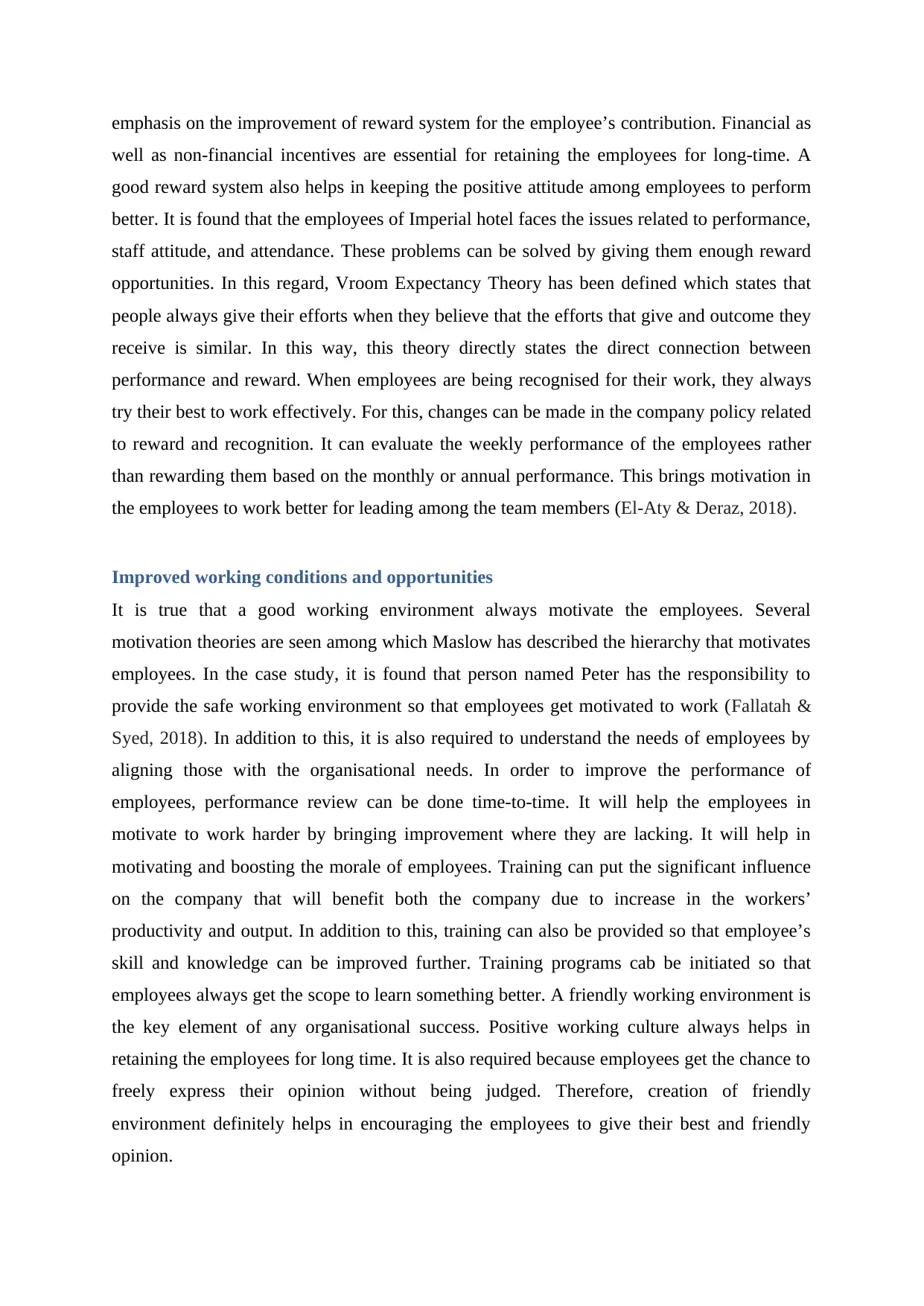
emphasis on the improvement of reward system for the employee’s contribution. Financial as
well as non-financial incentives are essential for retaining the employees for long-time. A
good reward system also helps in keeping the positive attitude among employees to perform
better. It is found that the employees of Imperial hotel faces the issues related to performance,
staff attitude, and attendance. These problems can be solved by giving them enough reward
opportunities. In this regard, Vroom Expectancy Theory has been defined which states that
people always give their efforts when they believe that the efforts that give and outcome they
receive is similar. In this way, this theory directly states the direct connection between
performance and reward. When employees are being recognised for their work, they always
try their best to work effectively. For this, changes can be made in the company policy related
to reward and recognition. It can evaluate the weekly performance of the employees rather
than rewarding them based on the monthly or annual performance. This brings motivation in
the employees to work better for leading among the team members (El-Aty & Deraz, 2018).
Improved working conditions and opportunities
It is true that a good working environment always motivate the employees. Several
motivation theories are seen among which Maslow has described the hierarchy that motivates
employees. In the case study, it is found that person named Peter has the responsibility to
provide the safe working environment so that employees get motivated to work (Fallatah &
Syed, 2018). In addition to this, it is also required to understand the needs of employees by
aligning those with the organisational needs. In order to improve the performance of
employees, performance review can be done time-to-time. It will help the employees in
motivate to work harder by bringing improvement where they are lacking. It will help in
motivating and boosting the morale of employees. Training can put the significant influence
on the company that will benefit both the company due to increase in the workers’
productivity and output. In addition to this, training can also be provided so that employee’s
skill and knowledge can be improved further. Training programs cab be initiated so that
employees always get the scope to learn something better. A friendly working environment is
the key element of any organisational success. Positive working culture always helps in
retaining the employees for long time. It is also required because employees get the chance to
freely express their opinion without being judged. Therefore, creation of friendly
environment definitely helps in encouraging the employees to give their best and friendly
opinion.
well as non-financial incentives are essential for retaining the employees for long-time. A
good reward system also helps in keeping the positive attitude among employees to perform
better. It is found that the employees of Imperial hotel faces the issues related to performance,
staff attitude, and attendance. These problems can be solved by giving them enough reward
opportunities. In this regard, Vroom Expectancy Theory has been defined which states that
people always give their efforts when they believe that the efforts that give and outcome they
receive is similar. In this way, this theory directly states the direct connection between
performance and reward. When employees are being recognised for their work, they always
try their best to work effectively. For this, changes can be made in the company policy related
to reward and recognition. It can evaluate the weekly performance of the employees rather
than rewarding them based on the monthly or annual performance. This brings motivation in
the employees to work better for leading among the team members (El-Aty & Deraz, 2018).
Improved working conditions and opportunities
It is true that a good working environment always motivate the employees. Several
motivation theories are seen among which Maslow has described the hierarchy that motivates
employees. In the case study, it is found that person named Peter has the responsibility to
provide the safe working environment so that employees get motivated to work (Fallatah &
Syed, 2018). In addition to this, it is also required to understand the needs of employees by
aligning those with the organisational needs. In order to improve the performance of
employees, performance review can be done time-to-time. It will help the employees in
motivate to work harder by bringing improvement where they are lacking. It will help in
motivating and boosting the morale of employees. Training can put the significant influence
on the company that will benefit both the company due to increase in the workers’
productivity and output. In addition to this, training can also be provided so that employee’s
skill and knowledge can be improved further. Training programs cab be initiated so that
employees always get the scope to learn something better. A friendly working environment is
the key element of any organisational success. Positive working culture always helps in
retaining the employees for long time. It is also required because employees get the chance to
freely express their opinion without being judged. Therefore, creation of friendly
environment definitely helps in encouraging the employees to give their best and friendly
opinion.
⊘ This is a preview!⊘
Do you want full access?
Subscribe today to unlock all pages.

Trusted by 1+ million students worldwide
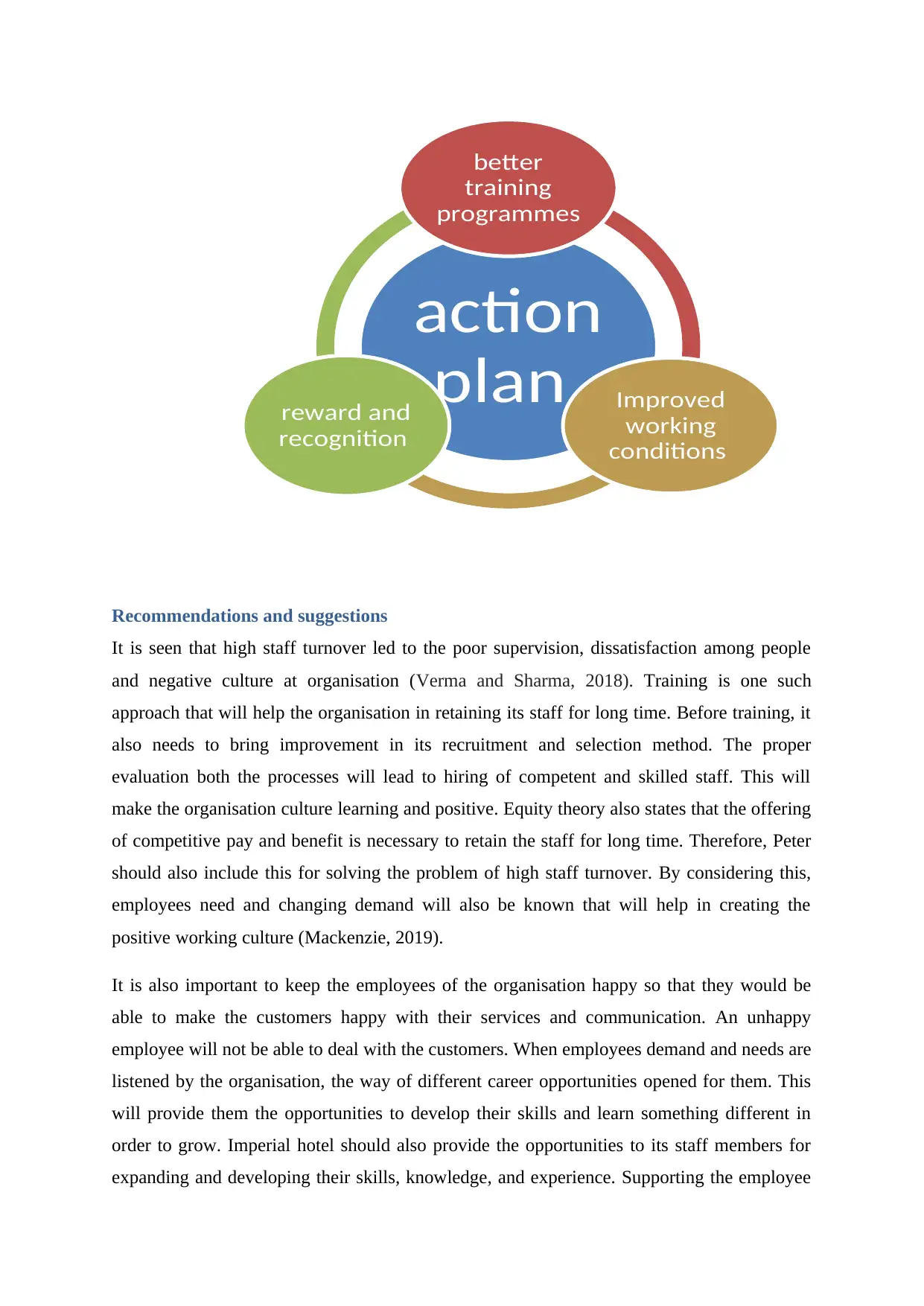
Recommendations and suggestions
It is seen that high staff turnover led to the poor supervision, dissatisfaction among people
and negative culture at organisation (Verma and Sharma, 2018). Training is one such
approach that will help the organisation in retaining its staff for long time. Before training, it
also needs to bring improvement in its recruitment and selection method. The proper
evaluation both the processes will lead to hiring of competent and skilled staff. This will
make the organisation culture learning and positive. Equity theory also states that the offering
of competitive pay and benefit is necessary to retain the staff for long time. Therefore, Peter
should also include this for solving the problem of high staff turnover. By considering this,
employees need and changing demand will also be known that will help in creating the
positive working culture (Mackenzie, 2019).
It is also important to keep the employees of the organisation happy so that they would be
able to make the customers happy with their services and communication. An unhappy
employee will not be able to deal with the customers. When employees demand and needs are
listened by the organisation, the way of different career opportunities opened for them. This
will provide them the opportunities to develop their skills and learn something different in
order to grow. Imperial hotel should also provide the opportunities to its staff members for
expanding and developing their skills, knowledge, and experience. Supporting the employee
action
plan
better
training
programmes
Improved
working
conditions
reward and
recognition
It is seen that high staff turnover led to the poor supervision, dissatisfaction among people
and negative culture at organisation (Verma and Sharma, 2018). Training is one such
approach that will help the organisation in retaining its staff for long time. Before training, it
also needs to bring improvement in its recruitment and selection method. The proper
evaluation both the processes will lead to hiring of competent and skilled staff. This will
make the organisation culture learning and positive. Equity theory also states that the offering
of competitive pay and benefit is necessary to retain the staff for long time. Therefore, Peter
should also include this for solving the problem of high staff turnover. By considering this,
employees need and changing demand will also be known that will help in creating the
positive working culture (Mackenzie, 2019).
It is also important to keep the employees of the organisation happy so that they would be
able to make the customers happy with their services and communication. An unhappy
employee will not be able to deal with the customers. When employees demand and needs are
listened by the organisation, the way of different career opportunities opened for them. This
will provide them the opportunities to develop their skills and learn something different in
order to grow. Imperial hotel should also provide the opportunities to its staff members for
expanding and developing their skills, knowledge, and experience. Supporting the employee
action
plan
better
training
programmes
Improved
working
conditions
reward and
recognition
Paraphrase This Document
Need a fresh take? Get an instant paraphrase of this document with our AI Paraphraser
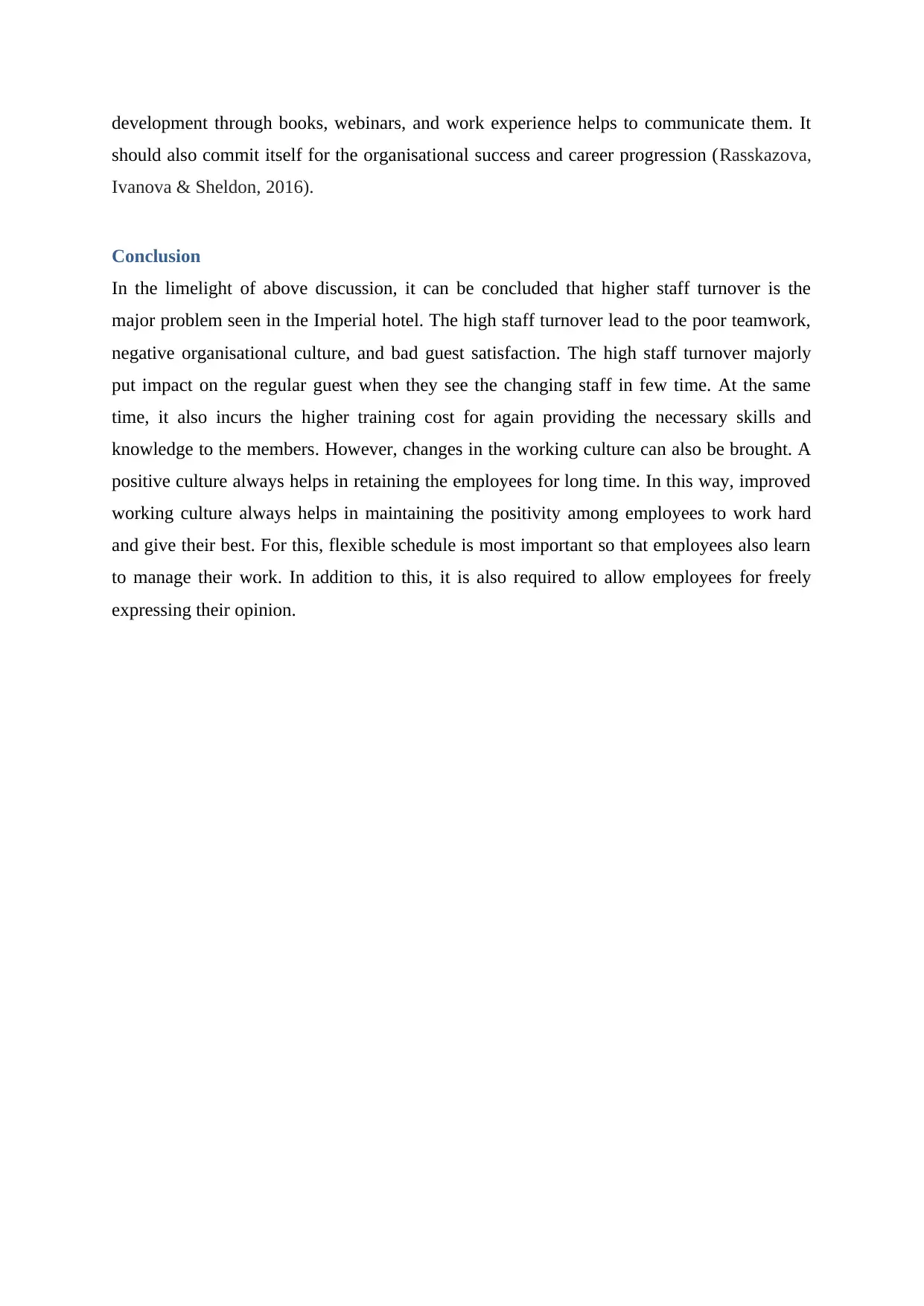
development through books, webinars, and work experience helps to communicate them. It
should also commit itself for the organisational success and career progression (Rasskazova,
Ivanova & Sheldon, 2016).
Conclusion
In the limelight of above discussion, it can be concluded that higher staff turnover is the
major problem seen in the Imperial hotel. The high staff turnover lead to the poor teamwork,
negative organisational culture, and bad guest satisfaction. The high staff turnover majorly
put impact on the regular guest when they see the changing staff in few time. At the same
time, it also incurs the higher training cost for again providing the necessary skills and
knowledge to the members. However, changes in the working culture can also be brought. A
positive culture always helps in retaining the employees for long time. In this way, improved
working culture always helps in maintaining the positivity among employees to work hard
and give their best. For this, flexible schedule is most important so that employees also learn
to manage their work. In addition to this, it is also required to allow employees for freely
expressing their opinion.
should also commit itself for the organisational success and career progression (Rasskazova,
Ivanova & Sheldon, 2016).
Conclusion
In the limelight of above discussion, it can be concluded that higher staff turnover is the
major problem seen in the Imperial hotel. The high staff turnover lead to the poor teamwork,
negative organisational culture, and bad guest satisfaction. The high staff turnover majorly
put impact on the regular guest when they see the changing staff in few time. At the same
time, it also incurs the higher training cost for again providing the necessary skills and
knowledge to the members. However, changes in the working culture can also be brought. A
positive culture always helps in retaining the employees for long time. In this way, improved
working culture always helps in maintaining the positivity among employees to work hard
and give their best. For this, flexible schedule is most important so that employees also learn
to manage their work. In addition to this, it is also required to allow employees for freely
expressing their opinion.
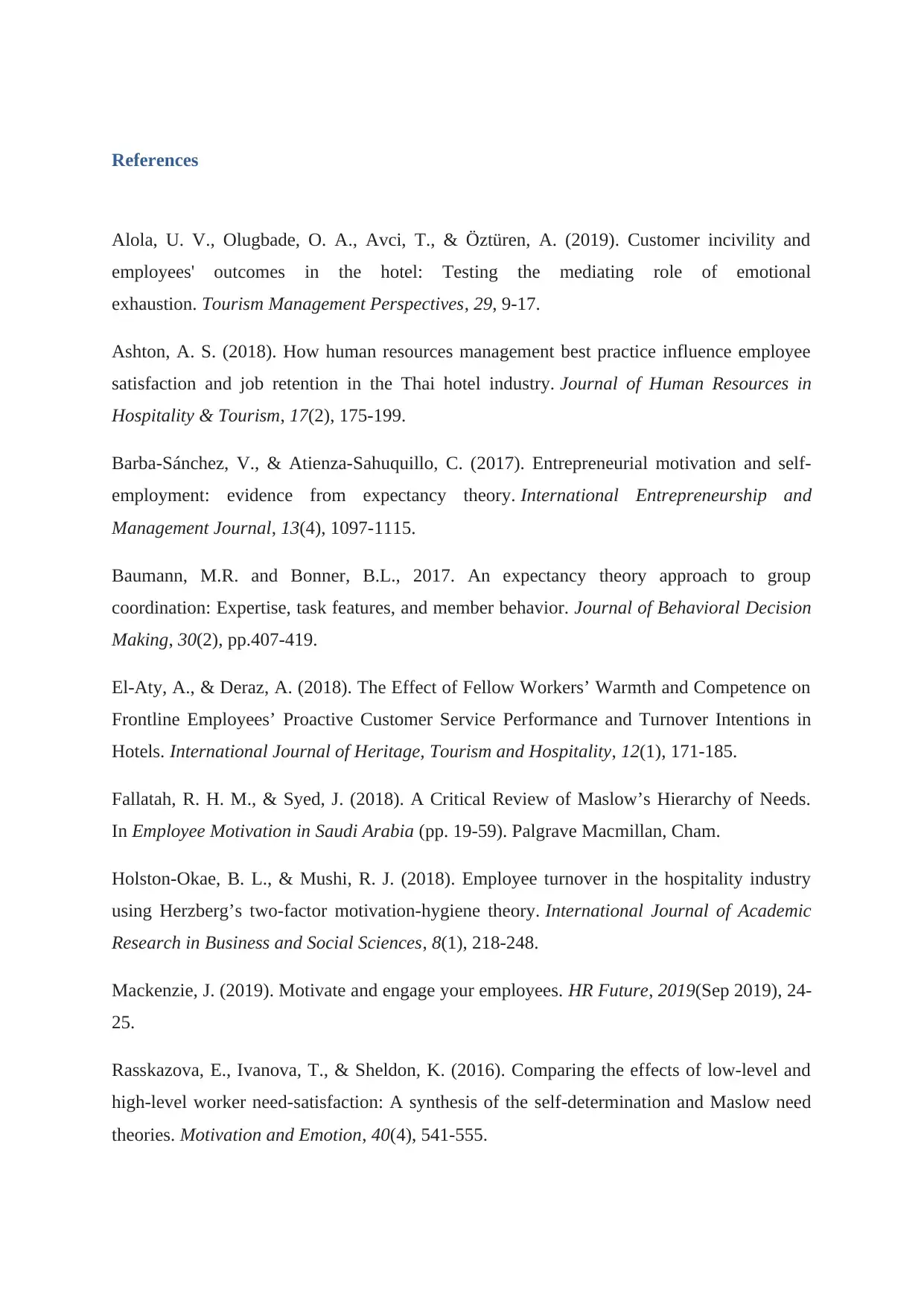
References
Alola, U. V., Olugbade, O. A., Avci, T., & Öztüren, A. (2019). Customer incivility and
employees' outcomes in the hotel: Testing the mediating role of emotional
exhaustion. Tourism Management Perspectives, 29, 9-17.
Ashton, A. S. (2018). How human resources management best practice influence employee
satisfaction and job retention in the Thai hotel industry. Journal of Human Resources in
Hospitality & Tourism, 17(2), 175-199.
Barba-Sánchez, V., & Atienza-Sahuquillo, C. (2017). Entrepreneurial motivation and self-
employment: evidence from expectancy theory. International Entrepreneurship and
Management Journal, 13(4), 1097-1115.
Baumann, M.R. and Bonner, B.L., 2017. An expectancy theory approach to group
coordination: Expertise, task features, and member behavior. Journal of Behavioral Decision
Making, 30(2), pp.407-419.
El-Aty, A., & Deraz, A. (2018). The Effect of Fellow Workers’ Warmth and Competence on
Frontline Employees’ Proactive Customer Service Performance and Turnover Intentions in
Hotels. International Journal of Heritage, Tourism and Hospitality, 12(1), 171-185.
Fallatah, R. H. M., & Syed, J. (2018). A Critical Review of Maslow’s Hierarchy of Needs.
In Employee Motivation in Saudi Arabia (pp. 19-59). Palgrave Macmillan, Cham.
Holston-Okae, B. L., & Mushi, R. J. (2018). Employee turnover in the hospitality industry
using Herzberg’s two-factor motivation-hygiene theory. International Journal of Academic
Research in Business and Social Sciences, 8(1), 218-248.
Mackenzie, J. (2019). Motivate and engage your employees. HR Future, 2019(Sep 2019), 24-
25.
Rasskazova, E., Ivanova, T., & Sheldon, K. (2016). Comparing the effects of low-level and
high-level worker need-satisfaction: A synthesis of the self-determination and Maslow need
theories. Motivation and Emotion, 40(4), 541-555.
Alola, U. V., Olugbade, O. A., Avci, T., & Öztüren, A. (2019). Customer incivility and
employees' outcomes in the hotel: Testing the mediating role of emotional
exhaustion. Tourism Management Perspectives, 29, 9-17.
Ashton, A. S. (2018). How human resources management best practice influence employee
satisfaction and job retention in the Thai hotel industry. Journal of Human Resources in
Hospitality & Tourism, 17(2), 175-199.
Barba-Sánchez, V., & Atienza-Sahuquillo, C. (2017). Entrepreneurial motivation and self-
employment: evidence from expectancy theory. International Entrepreneurship and
Management Journal, 13(4), 1097-1115.
Baumann, M.R. and Bonner, B.L., 2017. An expectancy theory approach to group
coordination: Expertise, task features, and member behavior. Journal of Behavioral Decision
Making, 30(2), pp.407-419.
El-Aty, A., & Deraz, A. (2018). The Effect of Fellow Workers’ Warmth and Competence on
Frontline Employees’ Proactive Customer Service Performance and Turnover Intentions in
Hotels. International Journal of Heritage, Tourism and Hospitality, 12(1), 171-185.
Fallatah, R. H. M., & Syed, J. (2018). A Critical Review of Maslow’s Hierarchy of Needs.
In Employee Motivation in Saudi Arabia (pp. 19-59). Palgrave Macmillan, Cham.
Holston-Okae, B. L., & Mushi, R. J. (2018). Employee turnover in the hospitality industry
using Herzberg’s two-factor motivation-hygiene theory. International Journal of Academic
Research in Business and Social Sciences, 8(1), 218-248.
Mackenzie, J. (2019). Motivate and engage your employees. HR Future, 2019(Sep 2019), 24-
25.
Rasskazova, E., Ivanova, T., & Sheldon, K. (2016). Comparing the effects of low-level and
high-level worker need-satisfaction: A synthesis of the self-determination and Maslow need
theories. Motivation and Emotion, 40(4), 541-555.
⊘ This is a preview!⊘
Do you want full access?
Subscribe today to unlock all pages.

Trusted by 1+ million students worldwide
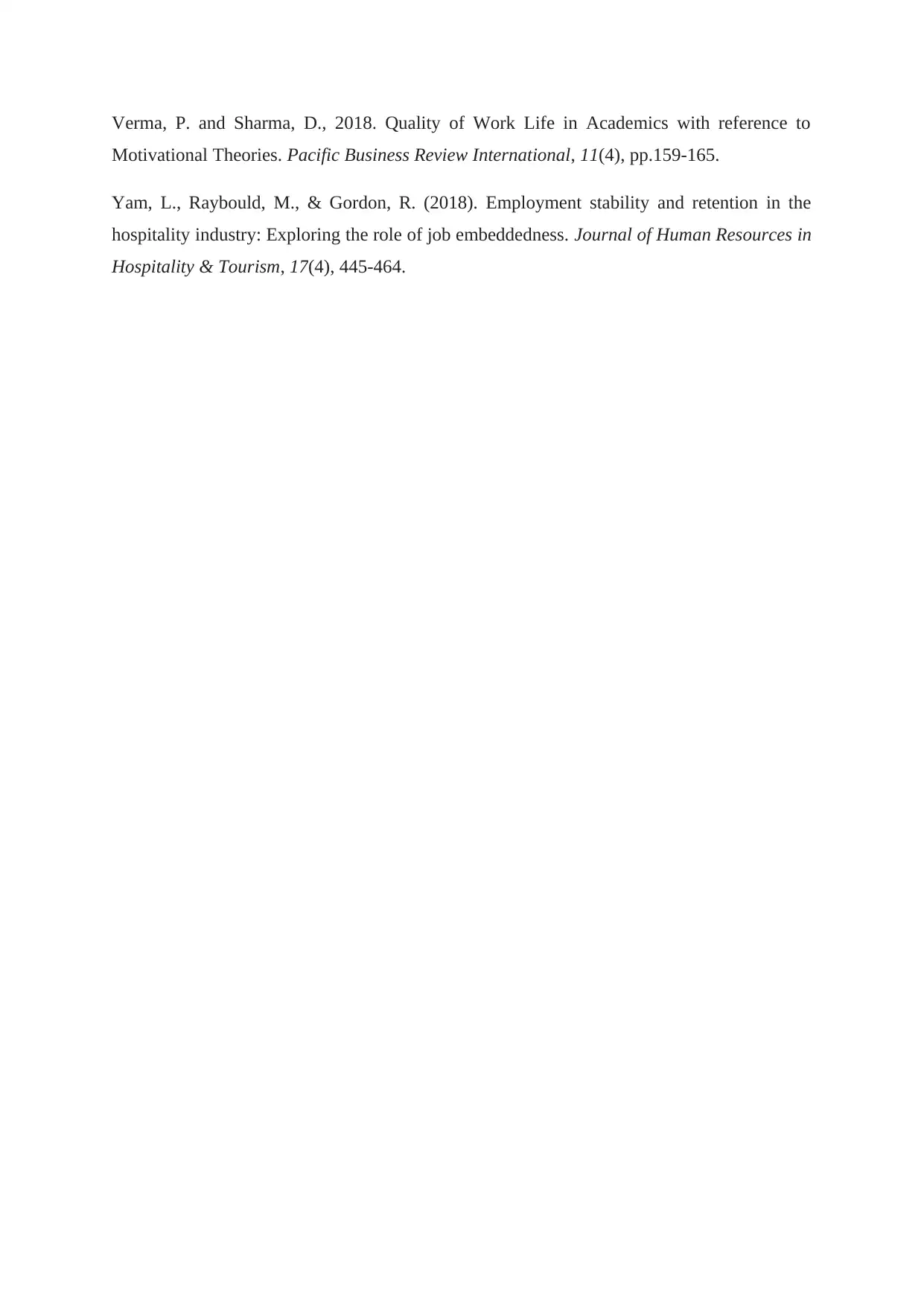
Verma, P. and Sharma, D., 2018. Quality of Work Life in Academics with reference to
Motivational Theories. Pacific Business Review International, 11(4), pp.159-165.
Yam, L., Raybould, M., & Gordon, R. (2018). Employment stability and retention in the
hospitality industry: Exploring the role of job embeddedness. Journal of Human Resources in
Hospitality & Tourism, 17(4), 445-464.
Motivational Theories. Pacific Business Review International, 11(4), pp.159-165.
Yam, L., Raybould, M., & Gordon, R. (2018). Employment stability and retention in the
hospitality industry: Exploring the role of job embeddedness. Journal of Human Resources in
Hospitality & Tourism, 17(4), 445-464.
1 out of 10
Related Documents
Your All-in-One AI-Powered Toolkit for Academic Success.
+13062052269
info@desklib.com
Available 24*7 on WhatsApp / Email
![[object Object]](/_next/static/media/star-bottom.7253800d.svg)
Unlock your academic potential
Copyright © 2020–2026 A2Z Services. All Rights Reserved. Developed and managed by ZUCOL.




